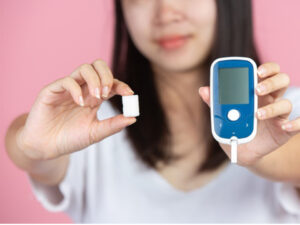
Diabetes And Preeclampsia
December 9, 2021
Can Diabetes Patients Go On A Detox Diet?
December 9, 2021Diabetes affects nearly 200 million women worldwide and India is home to the world’s second-largest diabetic population. Due to disparities in diabetes outcomes, with women being more adversely affected by the disease, it’s important to look at the gender context of the disease. The relationship between women and diabetes is a complex one because of differences in the manifestation of the disease, as well as gender biases in society, medical research, and healthcare. To better understand women’s health and diabetes, let’s take a closer look at the differences in both symptoms and outcomes.
Women And Diabetes Symptoms
Although most symptoms of type 1 and type 2 diabetes are common to both men and women, there are some symptoms that are only observed in women. These include:
Yeast Infections: These can include both vaginal and oral yeast infections, with vaginal yeast infections causing symptoms such as vaginal discharge, itching, pain, and discomfort during sexual intercourse. Oral yeast infections can cause inflammation and redness in the mouth, white patches, swelling of the gums, and difficulty eating or swallowing.
Reduced Sex Drive: While men can also be adversely affected with low libido, the problem is more common in women because of the impact of impaired blood flow to the genitalia and nerve damage, which reduces arousal and increases vaginal dryness.
PCOS: This is a common comorbidity with diabetes in women that is linked to insulin resistance and a high risk of diabetes. This can cause symptoms such as menstrual irregularities, acne, male pattern balding, and excessive hair growth on the face and body.
Urinary Infections: Urinary tract infections are extremely common in women in general, but the risk is even higher among women with diabetes because elevated levels of sugar in urine make the urinary tract more conducive to bacterial growth.
Women’s Health And Diabetes Outcomes

Differences in outcomes are the biggest concern when dealing with women and diabetes. It helps to have a greater awareness of these risks.
Heart Disease
All diabetes patients have a higher risk of heart disease, but the risks are even higher for women. Women with diabetes before menopause do not enjoy the same protection against heart disease that other women have and they also have a 50% higher risk of death as compared to men. Research shows that 36.9% of diabetic women who suffer a heart attack succumb to the condition within a year, as compared to just 20.2% of nondiabetic women.
Stroke Risk
Women with diabetes also face a higher risk of stroke, with diabetic women having four times higher risk as compared to non-diabetic women.
Diabetic Retinopathy
Diabetic retinopathy and visual impairment pose a greater risk to women, with women being more susceptible to vision loss because of diabetic retinopathy as compared to men. Diabetic women with pre-existing diabetic retinopathy can also suffer a significant deterioration in vision during pregnancy.
Kidney Disease
The risk of death is significantly higher among elderly women who suffer from type 2 diabetes and end-stage renal disease, as compared to men who suffer from similar health problems.
Diabetic Ketoacidosis
Before menopause, women experience cyclical hormonal changes with their menstrual cycle. This can make diabetes control significantly tougher, increasing the risk of diabetic ketoacidosis in women. This is a serious complication that requires hospitalization.
Depression
Although the risk of mental illness is higher among all diabetes patients, women with diabetes tend to develop depression at higher rates than diabetic men.
While some of the adverse outcomes are due to biological differences, women also suffer from discrimination and tend to receive less intensive care in developing and underdeveloped countries, contributing to such poor outcomes. Increased awareness of the risks of diabetes in women and recognition of gender biases in healthcare can help you take precautions and also ensure that you receive the care that you deserve.
References:
- https://www.ncbi.nlm.nih.gov/pmc/articles/PMC5861464/
- https://www.ncbi.nlm.nih.gov/pmc/articles/PMC1326926/
- https://pubmed.ncbi.nlm.nih.gov/9538972/
- https://pubmed.ncbi.nlm.nih.gov/2043016/
- https://pubmed.ncbi.nlm.nih.gov/9223395/
- https://care.diabetesjournals.org/content/30/12/3070.long




